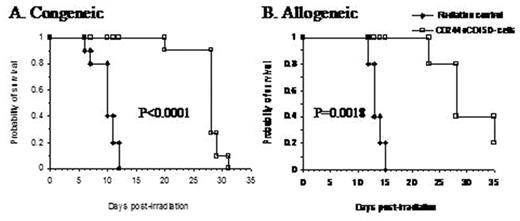Abstract
Whole-body irradiation may lead to bone marrow failure and death. It was previously reported that congenic myeloerythroid-restricted progenitors are able to radioprotect lethally irradiated animals. However, this approach will not be practical because syngeneic/congenic donors are rarely available in humans. To solve this problem, we investigated whether allogeneic committed progenitors are also radioprotective. Hematopoietic committed progenitors were isolated by FACS based on the presence of early progenitor marker CD244 and the absence of stem cell marker CD150 (CD244+CD150−). BALB/c mice (H2d) were lethally irradiated with 8.5 Gy. Within 4 hours of irradiation, the irradiated mice were infused with 5x105 sorted hematopoietic progenitors from major histocompatibility complex mistmatched C57BL/6 donors (H2b). As shown in the Figure B, all the mice in the radiation control group died within 15 days post irradiation (median survival time: 13 days). Infusion of hematopoietic committed progenitors significantly prolonged the survival of the lethally irradiated mice (P=0.0018, median survival time: 28 days). These results are similar to the results obtained from congenic hematopoietic progenitors using 1x105 cells (Figure A, P<0.0001, median survival time: 10 days vs. 28 days). These data suggest that allogeneic hematopoietic committed progenitor cells are also able to mediate radioprotective effects. Similar to the congenic hematopoietic committed progenitors, allogeneic progenitors may also exert radioprotective effects by jumpstarting hematologic recovery post irradiation. These cells may be stockpiled and used as “off-the-shelf” products for radiation injury and other applications.
Author notes
Disclosure: No relevant conflicts of interest to declare.


This feature is available to Subscribers Only
Sign In or Create an Account Close Modal